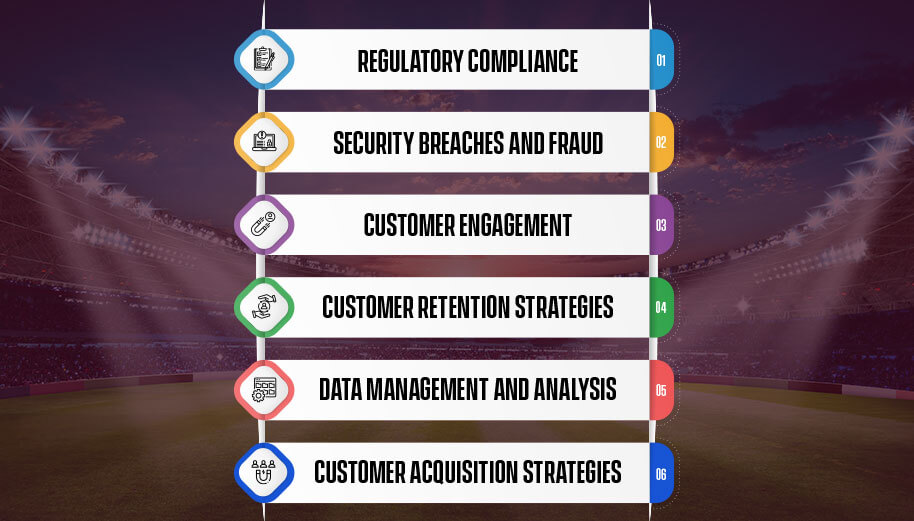
Overview of Current Sports Betting Market
Challenges Faced by the Sports Betting Industry

Regulatory compliance
The sports betting industry is regulated by different bodies in different countries, which means that it is not one unified market. Instead, it consists of a number of different markets with different regulations and laws. This has been made more complicated by the fact that countries have different approaches to gambling regulation, some banning it altogether while others allow it only within certain geographical locations or jurisdictions. Additionally, the regulatory compliance costs associated with operating an online sportsbook or casino can be extremely high especially when compared to other forms of gambling such as land-based casinos or lotteries where physical offices need to be maintained and staff hired.
Security breaches and fraud
The sports betting industry is not immune to security breaches, despite the fact that it uses blockchain technology as its main medium of exchange. One of the biggest issues that the industry faces is that most of the transactions are done in cash. The lack of transparency makes it easier for criminals to target them for their own gains. In addition, many people do not know how to use cryptocurrency wallets properly which makes them easy targets for cybercriminals. The problem with online gambling sites is that they can easily be hacked by hackers who want to steal people's money without getting caught. In addition, there have been cases where people claim they have won a big payout but never received anything after making their bets on these websites.
Customer engagement
Sports betting has become more convenient and accessible in recent years, with the rise of mobile sports betting apps and other digital solutions. However, there are still many hurdles to overcome in this area. For example, players have to download and register with multiple apps and deal with various user interfaces that can be confusing or complicated.
Customer retention strategies
Customer retention strategies are the most important tools in any business. These strategies help businesses retain their customers and increase sales. The sports betting industry is no exception to this rule, but it does face some unique challenges when it comes to keeping customers happy and loyal. The first of these challenges is that many potential new customers are not aware of the existence of a sports betting site or gambling website, or they simply don't know how to find one. This is especially true for people who live in countries where online gambling is illegal or heavily regulated. There are also many misconceptions about online gambling that may prevent people from signing up for an account at an online sportsbook. Some people mistakenly believe that they have to deposit money in order to place a bet, while others think that they have to download software onto their computer or phone before they can start wagering on their favorite teams and players. Neither of these things are true, but they're still common misconceptions among those who have never tried online sports betting before.
Data management and analysis
The data that sportsbooks generate is not only voluminous but also unstructured. This makes it difficult for them to analyze the information and derive useful insights from it. For example, data related to bets placed by customers can be used to identify trends and make better predictions about future events. Sports betting platforms have been designed to enable the users to place their bets online, which means that these platforms have access to all the relevant information. However, they face a huge challenge when it comes to managing this data since it is spread across multiple systems, databases and sources.
Customer acquisition strategies
Customer acquisition strategies are a critical component of any business model. As such, sports betting operators need to find new ways of acquiring customers in order to keep up with their competitors and grow their businesses. Sports betting operators have traditionally relied on direct marketing or word-of-mouth advertising as their main customer acquisition strategy. However, as the market continues to grow, it’s becoming more and more difficult for operators to acquire customers at a low cost and with little effort. The challenge is further compounded by the fact that most sports betting operators are startups or small businesses that don’t have the resources to invest in expensive marketing campaigns and promotions like TV commercials or billboards.
Recent Trends in Sports Betting Industry


Sports Betting Goes Global
Sports betting has gone global and online sportsbooks are now available in almost every country on earth. These online bookies offer games from all over the world, giving customers an opportunity to place bets on their favorite teams from anywhere in the world. The availability of live streaming means that you can watch your favorite teams while placing wagers at any time of day or night, regardless of where you live or how far away they might be playing from you.

Esports Grows Rapidly
The esports industry is growing rapidly and it is not just the traditional sports betting companies that are taking notice. Traditional casino operators, online gambling sites, and even state lotteries have begun to offer esports as a gambling option. In fact, esports betting has become so lucrative that some casinos have been forced to close their digital doors because of the overwhelming number of bettors placing wagers on esports events. Just like traditional sports, there are different leagues for different games and types of competition. Some leagues are professional while others are considered amateur or semi-professional. Some games allow you to bet on individual matches while others allow you to put down money on leagues or tournaments as a whole rather than just individual matches.

More States Legalize Sports Betting
Sports betting has become a popular pastime for Americans. In fact, more than half of the U.S. population bets on sports each year, and that number is growing every year. The sports betting industry is growing rapidly as more states legalize gambling and sports fans discover the fun of playing with their favorite teams and players. People can now legally bet on their favorite sports teams in many states including New Jersey, Pennsylvania, West Virginia and Delaware. There are even some states where online gambling is allowed so you can place your bets from home or anywhere else with an internet connection!

Virtual Reality Casinos
Virtual reality casinos are becoming more and more popular across the globe, with many people opting to visit these sites instead of traditional brick-and-mortar casinos. Virtual reality casinos provide an immersive experience that allows users to play games as though they were actually there – including slot machines and table games such as blackjack and roulette. In addition, virtual reality casinos often have live dealers who can interact with players via webcam or other video chat services.

Blockchain Technology Drives Innovation in Sports Betting Industry
The blockchain is an incorruptible digital ledger that records transactions in real time and offers unrivaled transparency. It's also decentralized — no single entity controls it, making it impossible to tamper with. A blockchain-powered sportsbook would give punters complete control over their money and data, removing the need for middlemen like bookmakers or payment processors who charge high fees and store sensitive information on servers that can be hacked into. Blockchain technology is already being used by several sports betting companies around the world, helping them offer better odds and more interesting bets than traditional bookmakers ever could have dreamed of before now.

Integration of AI and ML in Sports Betting
Artificial intelligence (AI) and machine learning (ML) are two of the most popular and promising technologies that are currently changing the way we live. Many industries have adopted these two technologies in their daily operations, but the sports betting industry is still lagging behind. However, this is not surprising considering that sports betting is a highly regulated industry and it requires a lot of money to develop new technologies. Sports betting companies can use AI and ML to enhance their products, provide better customer service and improve their marketing efforts. For example, it is possible to use AI to predict which player will win a game or provide accurate information about the score in a match. Moreover, it is possible to use ML algorithms to detect fraudsters or prevent money laundering schemes.
iGamingBook: One Stop Solution for Sports Betting Platforms
FAQs
The biggest trend in sports betting is the rise of mobile betting. More and more people are using their phones and tablets to place bets, which is great for the industry because it means more people are getting interested in sports betting.
Another trend we're seeing is the rise of eSports, or competitive video games played by professionals. People are paying such close attention to these leagues, and that's leading to even more interest in sports betting overall.
Sports betting has always been a big part of American culture and it's only getting bigger. As more states legalize sports betting and more people begin to bet online, we expect the industry to continue growing at a steady rate.
Yes! The sports betting industry is growing every year, and it's expected to continue growing for the foreseeable future.
Cryptocurrency can be used in sports betting to make it easier for the bettor to access their funds and make their bets. It also allows them to have more control over the amount of money they spend on gambling.
Sources:
- https://fortune.com/2022/01/24/legalized-sports-betting-in-the-u-s-doubled-in-2021-heres-why-that-will-continue-after-the-greatest-weekend-in-nfl-playoff-history/
- https://www.globenewswire.com/en/news-release/2022/07/14/2479929/0/en/Sports-Betting-Market-Size-Is-Likely-to-Experience-a-Tremendous-Growth-of-USD-167-66-billion-by-2029-registering-a-CAGR-of-10-26-by-Size-and-Share-Industry-Growth-Regional-Outlook-.html